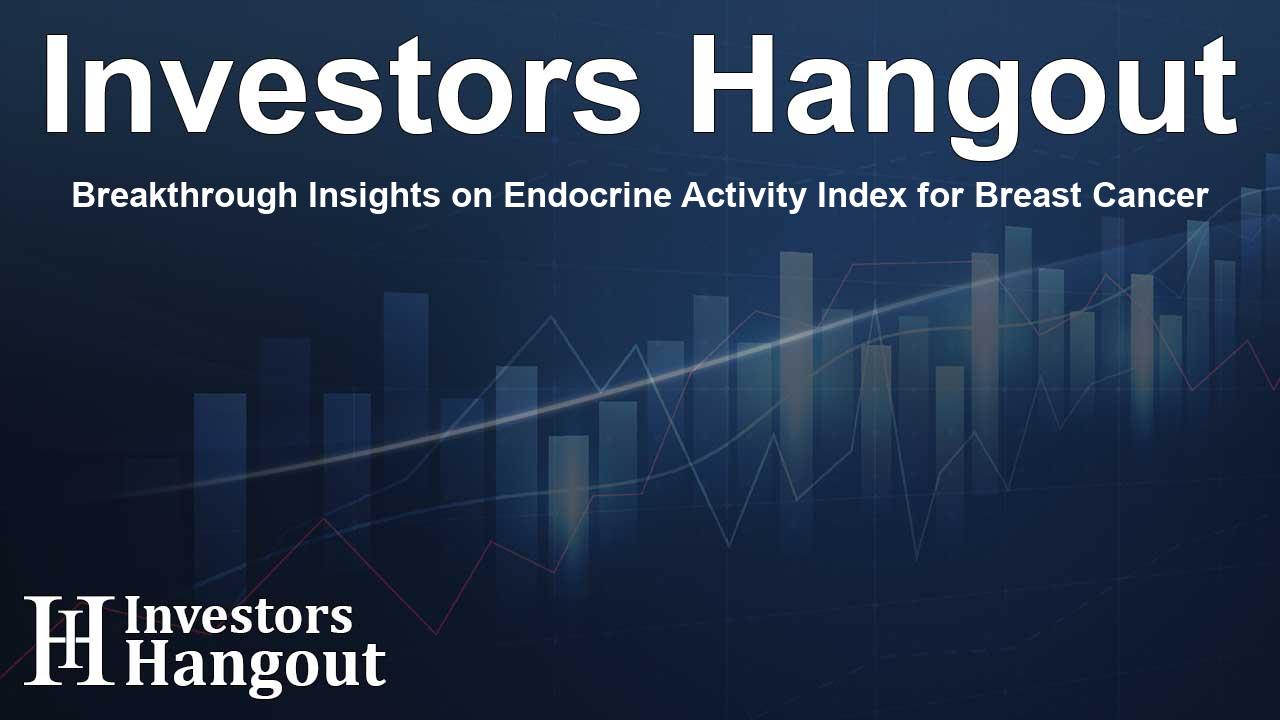Breakthrough Insights on Endocrine Activity Index for Breast Cancer

Understanding the Endocrine Activity Index and Its Significance
Recent research sheds light on the Endocrine Activity Index (EAI) and its crucial role in predicting the success of dose-dense chemotherapy in hormone receptor-positive breast cancer. This innovative approach offers a reliable method to determine which patients are likely to benefit from this type of treatment, potentially transforming the landscape of breast cancer therapy.
Key Findings from Recent Trials
Data presented from the GEICAM/9906 trial has reinforced the EAI's predictive capabilities. It aligns with findings from the CALGB 9741 trial, which highlighted the EAI's importance over a significant 12-year follow-up period. This work illuminates the potential of EAI in identifying candidates for more aggressive treatment strategies, particularly among patients with hormone receptor-positive breast cancer.
The CALGB 9741 Trial Analysis
The CALGB 9741 trial's retrospective analysis focused on 613 patients, concentrating on those with estrogen receptor-positive (ER+) node-positive cancer. The findings revealed that patients demonstrating an EAI score of less than 0.75 showed improved survival outcomes compared to others. This insight gives both oncologists and patients actionable data when considering treatment options.
Influence of EAI on Treatment Decisions
Dr. Miguel Martin’s presentation at the San Antonio Breast Cancer Symposium further validates the EAI's predictive power. His study confirmed that an EAI of less than 0.75 consistently correlated with better disease-free survival rates when patients underwent dose-dense paclitaxel-based chemotherapy. These findings hold immense promise for personalizing treatment modalities based on individual patient profiles.
Comments from Delphi Diagnostics Leadership
Winz Casagrande, CEO of Delphi Diagnostics, expressed optimism about these findings, emphasizing the EAI as a vital tool for determining chemotherapy benefits. The results from both trials support the potential for EAI to reshape therapeutic strategies and enhance healthcare providers’ decision-making capabilities.
Dr. Federico A. Monzon, Chief Medical Officer, also noted the significance of these studies, suggesting a shift away from traditional approaches, where treatment decisions relied heavily on tumor burden and pathology metrics. Instead, incorporating EAI into clinical practice could lead to more tailored therapies for patients.
Implications for Future Research and Clinical Practice
The emerging evidence surrounding the Endocrine Activity Index offers a glimmer of hope in the complex field of breast cancer treatment. By continuing to evaluate EAI's effectiveness in diverse patient populations and treatment plans, researchers might unlock new pathways for enhancing patient outcomes.
Additionally, the focus on endocrine activity could prompt oncologists to rethink how they assess treatment options for breast cancer patients, placing less emphasis on age or menopausal status, which has historically constrained patient eligibility for aggressive treatment regimes.
Delphi Diagnostics and Their Ongoing Commitment
Delphi Diagnostics Inc. remains committed to advancing personalized breast cancer care. Their proprietary EAI method stands at the forefront of research, offering a model for how precision medicine could be the future of oncology. With subsequent trials on the horizon, the goal remains clear: to refine treatment approaches that are as individualized as the patients themselves.
Frequently Asked Questions
What is the Endocrine Activity Index (EAI)?
The Endocrine Activity Index (EAI) is a test that measures the endocrine activity in breast tumors to predict benefits from specific chemotherapy regimens.
How does EAI affect treatment decisions in breast cancer?
By evaluating EAI scores, doctors can better identify which patients are likely to respond positively to dose-dense chemotherapy, enabling tailored treatment plans.
What were the key findings from the CALGB 9741 trial?
The CALGB 9741 trial revealed that patients with an EAI under 0.75 experienced significantly improved disease-free and overall survival rates after receiving dose-dense chemotherapy.
Who conducted the recent studies validating EAI?
The recent studies were led by significant figures including Dr. Otto Metzger and Dr. Miguel Martin, highlighting the EAI's predictive capabilities in patient outcomes.
What is the future of EAI in breast cancer treatment?
The future of EAI involves further research to refine its efficacy and more widespread implementation to enhance personalized treatment strategies in clinical settings.
About The Author
Contact Hannah Lewis privately here. Or send an email with ATTN: Hannah Lewis as the subject to contact@investorshangout.com.
About Investors Hangout
Investors Hangout is a leading online stock forum for financial discussion and learning, offering a wide range of free tools and resources. It draws in traders of all levels, who exchange market knowledge, investigate trading tactics, and keep an eye on industry developments in real time. Featuring financial articles, stock message boards, quotes, charts, company profiles, and live news updates. Through cooperative learning and a wealth of informational resources, it helps users from novices creating their first portfolios to experts honing their techniques. Join Investors Hangout today: https://investorshangout.com/
The content of this article is based on factual, publicly available information and does not represent legal, financial, or investment advice. Investors Hangout does not offer financial advice, and the author is not a licensed financial advisor. Consult a qualified advisor before making any financial or investment decisions based on this article. This article should not be considered advice to purchase, sell, or hold any securities or other investments. If any of the material provided here is inaccurate, please contact us for corrections.
